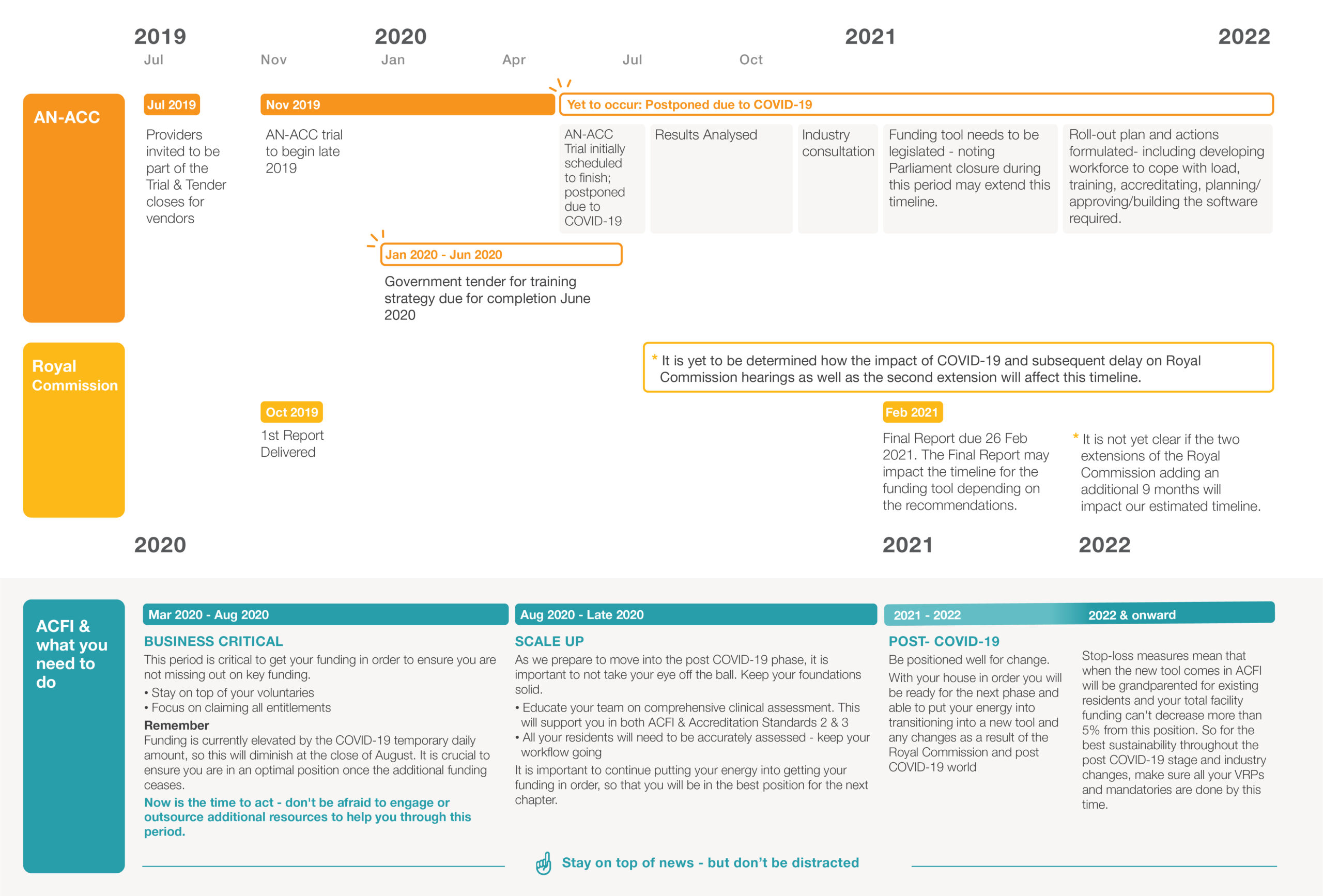It has been an extremely challenging – to say the very least – start to the new decade. As a result of the first few months of the year, we had held off on our usual monthly Industry Updates, with much of the news being focused on Covid-19 and the huge effect it has had across our industry.
With news frequently changing, and regular updates being provided by Aged Care outlets, this month will continue to look a little different for our industry update. We’d like to continue to gather information that is important to our community, whilst acknowledging that currently we are in a time where resources, information and support are of the most importance. For this month, we’ll share helpful information, resources and guides that can assist along with recent updates, government announcements, and some of the positive things happening in our industry throughout this time.
With a lot changing very rapidly, we’ll focus on sharing the important facts that stand for our industry at this point in time as a result of the pandemic.
There are many excellent resources out there that are sharing timely information when things are changing so rapidly. We highly recommend keeping up to date with all the Aged Care peak bodies, who continue to provide a great deal of support and information in this time; the Ageing Agenda, Talking Aged Care, the Weekly Source & the Donaldson Sisters for timely Aged Care news; and the Department of Health updates.
COVID-19 HELPFUL RESOURCES
There are a number of resources that have been made available to help assist with the current pandemic.
- Aged & Community Services Australia (ACSA) have a page dedicated to up to date information on Covid-19 that affects the Aged Care Industry, as well as a collection of links to relevant information. You can view the page here.
- The Department of Health(DoH) releases a daily COVID-19 newsletter which is shared with current subscribers to the DoH’s mailing list. To subscribe, sign up here. The DoH’s advice for the Health & Aged Care sector specifically relating to COVID-19 can be viewed here.
- The DoH’s collection of resources specific to COVID-19 can be found here.
- Further information provided by the DoH includes managing COVID-19 in a facility in the first 24 hours; and an information fact sheet on workforce contingency measures.
- Communicable Diseases Network Australia (CDNA) have released guidance for symptom monitoring in health & Aged Care workers to assist with detection and outbreak prevention.
- A video on the use of Personal Protective Equipment (PPE) is available here.
- COVID-19 infection control training is available for all Health Care workers here.
- The Australian Commission on Safety and Quality in Health Care (ACSQHC) also provides eLearning modules for infection prevention and control here.
- The Aged Care Quality & Safety Commission provide information and updates on the Commission’s regulatory response to COVID-19 here and have released resources on responding to a COVID-19 outbreak, Are you alert and ready? You can find the resources for Residential Care here, and the resources for Home Care here. They also have Consumer Resources available.
- A series of short informative videos hosted by Dr Norman Swan (physician and ABC Journalist & Broadcaster) covering a range of topics to protect older Australians during COVID-19. The series, ‘Your health is in all of our hands – keeping older Australians safe from COVID-19’, is in partnership with Leading Age Services Australia (LASA) and the Older Persons Advocacy Network (OPAN) and is available on YouTube.
- Dementia Australia’s Learning platform are offering two free, self-paced courses to help carers with caring for people with Dementia throughout COVID-19.
- The Australian Government has released information on COVID-19 in 63 languages other than English for culturally and linguistically diverse communities.
- This video covers how and when to use PPE in Aged Care
- This page is the Department of Health’s advice for Health & Aged Care workers when battling COVID-19, including when to use PPE
If there are any that you believe we have missed that would be helpful to share, please let us know at team@providerassist.com.au.
ROYAL COMMISSION
The Royal Commission’s decision in late March to suspend all hearings, workshops and group consultations as a part of the Aged Care Royal Commission has been lifted. On the 23rd June the Commission announced a return to hearings, commencing with the Melbourne Hearing on mental health, oral health and allied health care in aged care that had previously been cancelled. This hearing was rescheduled to take place 15th-17th July. Prior to the hearing, the Commission released Practice Guideline 6 – Virtual Public Hearings, which will guide the decision around conducting hearings virtually – either in part or in full.
However, the delay to the Commission’s hearings as a result of COVID-19, and the inclusion of examining the impact of the pandemic on Aged Care Providers, has led to the Commission’s second extension. A request made by the Royal Commission to extend the inquiry and therefore the final report was approved an announced on the 9th July 2020. The inquiry will be extended for 3 months with a final report due 26th February 2021. The Hon Tony Pagone QC will also be formally appointed as the Chair of the Royal Commission, having acting in the position following the death of the Honourable Richard Ross Sinclair Tracey AM RFD QC in late 2019. You can read the official media release here.
Public Submissions were also been extended for another month, to the 31st July 2020.
Despite the delay in hearings, work in the Royal Commission space continued. The Royal Commission have called for submissions on the impact of COVID-19 on Aged Care facilities, and on the 14th May announced a further inquiry into issues, responses and impact from the pandemic that will form part of its investigation on Aged Care Quality & Safety. This would include an investigation of the Newmarch outbreak and also look at what more could have been done to support Aged Care facilities that experienced outbreaks.
Research and Policy development by the Commission that has been continuing whilst hearings were shut down, will start to be released to the public. This has begun with the release of Consultation Paper 2 – Financing Aged Care. The paper examines the current funding systems in both Australia and overseas to provide a number of potential options for future funding. Consultation with and submissions from the community has been encouraged by the Peak Bodies. Submissions relating to the paper will be accepted until the 4th August 2020.
Research Papers 4 & 5 were also released in July, covering research, focus groups, interviews and survey results on community expectations for Aged Care. In the Commission’s media release, they stated that the research ‘confirms Australia’s aged care system needs major reform in order to align with community expectations’. You can find Research Paper 4 – What Australians think of ageing and aged care here, and Research Paper 5 – They look after you, you look after them: Community attitudes to ageing and aged care here.
UNANNOUNCED VISITS RESUME
In mid-March 2020, Providers were advised in a statement issued by the Aged Care Quality & Safety Commissioner Janet Anderson that unannounced visits would be postponed until further notice. At the Senate Select Committee on COVID-19 on the 26 May 2020, Ms Anderson stated that unannounced visits will recommence sometime in June, and the Aged Care Quality Newsletter from the 26th June states that unannounced visits had resumed.
Whilst other site visits were to continue based on specific circumstances, the Commission released a media statement on the regulatory activities that the Commission will undertake throughout the pandemic. Minister for Aged Care Richard Colbeck also released a media statement to reject claims made that no inspections had been taking place by the Quality & Safety Commission since the COVID-19 outbreak.
The 26th June Aged Care Quality Newsletter confirmed that a number of ‘off-site monitoring activities’ had been undertaken, and advice on reaccreditation site audits for Residential services would be released shortly.
AGED CARE VISITOR ACCESS CODE
After scrutiny by both the Federal Government and the Australian media of the Aged Care industry’s policies on visitor restrictions as a result of COVID-19, Aged Care consumer & peak bodies joined to request a nationally consistent code of guidelines. The release of the draft Aged Care Visitor Access Code was announced by Prime Minister Scott Morrison and opened for consultation from 1st May to the 7th May.
Designed by national Provider and consumer organisations, the code has been endorsed for public consultation by consumer advocacy organisations Carers Australia, Council on the Ageing Australia, Dementia Australia, National Seniors Australia and the Older Persons Advocacy Network and aged care provider peak bodies Aged & Community Services Australia, Aged Care Guild, Anglicare Australia, Baptist Care Australia, Catholic Health Australia, Leading Age Services Australia, and UnitingCare Australia.
After the consultation period, the code was released on the 12th May and was reviewed on the 29th May, and will be continuously reviewed to address any issues. You can find the latest version, updated on the 23rd July 2020, here, which had changes made to align with the Victorian government’s Care Facilities Directions (No. 8). You can read the First Review statement from the 29th May here.
Complaints to the Aged Care Quality & Safety Commission peaked in April, which Commissioner Janet Anderson said the majority of were related to visitor restrictions. It was reported by the DOH’s Deputy Secretary for Ageing and Aged Care that complaints had ‘settled’ since the Industry Code for visitor access was introduced.
GUIDING PRINCIPLES FOR RESIDENTIAL AGED CARE
On 22nd July 2020 the Guiding Principles for residential aged care – keeping Victorian residents and workers safe was released. The Principles aim to minimise the potential risk of Aged Care workers transmitting COVID-19 unintentionally, by supporting workers who would generally work across multiple Aged Care sites. Currently, the Principles are only in place for the Melbourne Metro and Mitchell Shire and will be in force from 27th July until 25th September 2020, where it may be extended dependant on requirements.
Despite the Principles reducing the number of facilities that workers can work at throughout the 8 week period, they will not be financially disadvantaged with their usual income to be paid.
Developed by Industry leaders, peak bodies, unions and the Government, you can read the Guiding Principles here.
VICTORIAN AGED CARE RESPONSE CENTRE
A Victorian Aged Care Response Centre has been set up, with the intention of coordinating and expanding resources to assist with the challenge of COVID-19 in Aged Care facilities across Victoria. The Response Centre is made up of a number of different stakeholders, with support from the Department of Health and Human Services (DHHS) Victoria, Emergency Management Australian (EMA) and Emergency Management Victoria (EMV); team members from the Department of Health, Aged Care Quality and Safety Commission, DHHS, EMA, EMV and Defence; and liaison arrangements with Older Persons Advisory Network, Australian Nursing and Midwifery Federation, the Australian Medical Association, Leading Aged Services Australia, Aged and Community Services Australia, the Aged Care Guild, Seniors Australia, Dementia Australia and Council Of The Ageing.
The centre will also work with Aged Care Providers, ensuring workers are not working in more than one facility.
AN-ACC TRIAL & 2020 ACAR ROUND ON HOLD
The Australian National Aged Care Classification (AN-ACC) assessment trial, that has been underway since late 2019 and was set to be completed in June 2020, has been put on hold for at least 6 months. The 2020 Aged Care Approval Round (ACAR), which had originally been set to open in March, and the home care payment alignment project have also been put on hold in order to focus resources on the COVID-19 outbreak. You can read the Minister’s media release here and view our updated timeline below. In this time of uncertainty, it is as of yet unclear how the delay of the trial, as well as the 3 month suspension of Royal Commission hearings will affect the remainder of the AN-ACC trial.
PANDEMIC LEAVE FOR AGED CARE RESIDENTS
New emergency legislation was implemented in May that allows Residents the freedom to move out of Aged Care during a crisis (such as the current COVID-19 pandemic) without being penalised. Under current legislation, Residents can take leave up to 52 days annually for social non-hospital reasons. However, for any additional leave taken, an Aged Care facility will not be provided a subsidy, and these costs are generally passed on to Residents. With the combined crises of both the Australian bushfires and COVID-19, the new Government legislation will cover emergency leave (available in times of natural disaster or health epidemics). This ensures that both Residents and Aged Care facilities who are affected by such circumstances are not financially disadvantaged. You can refer to the Emergency Leave legislation here.
FY2020 – 21 ACFI RATES
The ACFI rates for the 2020-21 financial year are in.
$78.3 million in temporary additional funding was announced by the Government in March to support additional costs and workforce supply pressures resulting from COVID-19 for Residential Aged Care, to be delivered through ACFI subsidies. The temporary funding has been in effect from March 1st 2020 and will cease on the 31st August 2020, meaning the first two months of ACFI rates in the new Financial Year will include the temporary increase.
For a breakdown of each ACFI Rate total for both payments from 1 July 2020 – 31 August 2020; and payments from 1 September 2020, you can visit our website here.
For all other New Rates of Payment from 1 July 2020 for any Aged Care Subsidies and Supplements – you can visit the DoH here.
ACFA & STEWARTBROWN REPORTS
With funding already a huge topic in the industry, there are increasing concerns of the viability of the sector with the impact of COVID-19 as of yet unknown, and rising issues such as occupancy. The latest StewartBrown report conveys a continuing trend of facilities operating at a loss, with 60% of Aged Care facilities in the red. Especially concerning is that the data only reflects the very start of the COVID-19 pandemic.
A significant decrease in occupancy has also been reported in the StewartBrown report.
This decline is also reflected in the Aged Care Financing Authority’s (ACFA) eight report Funding and Financing of the Aged Care Sector told the same story, with occupancy dipping to 89 per cent across all residential Aged Care places in 2018-19. It is the second year in a row occupancy has declined, and the fall is expected to continue with the impact of COVID-19. In May, Estia reported a 2.1% drop in occupancy, and it is expected that it is a likely story across the sector.
You can view the latest StewartBrown report here and the latest ACFA report here.
A recent study conducted by Flinders University in South Australia to inform the Royal Commission has indicated that use of Aged Care services in Australia is comparatively high – but ‘poorly funded’.
BUSINESS IMPROVEMENT FUND
At the close of January 2020, Aged Care Minister Richard Colbeck announced the launch of a targeted Aged Care Business Improvement Fund (BIF) of $48.7 million. The grants were made available to small to medium sized Aged Care Providers to support improving business operations, transfer ownership to another Provider, or to help deal with the costs of closing down, focusing in particular on those Providers who are in rural and remote regions affected by the 2019-20 Australian bushfires.
Applications were set to close in May 2020, however with the onset of the COVID-19 pandemic, grants for the fund have been extended until 30 April 2021. Aimed at assisting Providers who have limited access to other financial support and are facing significant financial burdens that could lead to closure or impact the care of Residents, the predicted impact of the pandemic on Providers may have been considered in the extension of the availability of the grants.
You can read more about the grants here, or if you are eligible for the Business Improvement Fund, or would like to find out more about business improvement strategies throughout the current climate, please call us on 1300 419 119 or team@providerassist.com.au. We currently have complimentary half hour business strategy review sessions available and would be happy to assist in any way that we may be able.
REGISTRATION SCHEME
Aged Care Minister Richard Colbeck has taken steps to establishing a Register for Aged Care workers, a suggestion that had been among 10 recommendations that Senior Counsel Assisting Peter Rozen QC had recommended for the Residential Aged Care workforce. In the final days of May, Minister Colbeck released a consultation paper of the Registration Scheme, with the intention of rolling it out over a number of stages with the full scheme implemented as early as 2022. Public consultation is open until June 29; after which the Government will be provided a detailed options paper. The intention of the national register means that professions in the Aged Care industry that are not currently required to maintain registration (such as Allied Health workers and Nurses) would undergo screening ‘without putting a red tape burden on them or service providers’ according to Minister Colbeck. You can read further on the Aged Care Worker Regulation Scheme Consultation paper here.
AGED CARE WORKFORCE PAYMENTS
In March, the Government announced a funding injection into Aged Care to assist with the COVID-19 outbreak. $234.9 million was allocated to a COVID-19 ‘retention bonus’ with the aim of supporting the continuity of the workforce (residential and Home Care) throughout this period. The bonus, however, has been criticised for not including all Residential Aged Care workers, with only Personal Care workers, Registered Nurses, Enrolled Nurses and Allied Health workers eligible, despite the number of other roles that make up a facility team; and the additional work required to apply for the bonus. In addition, in June the Government announced that the retention bonus would be taxed after all as it was considered income. The backflip was deeply disappointing to the sector and both peak body and union leaders have expressed their disappointment in the Government’s decision.
You can read more information about the grant here.
In late July, it was declared that Aged Care workers will be entitled to two weeks of paid Pandemic Leave as the result of a Fair Work Commission decision. Those working in Aged Care who are required to self-isolate due to COVID-19 will receive paid leave each time, with the Government providing compensation of the cost to Providers located in the greater Melbourne and Mitchell Shires. Other areas will be required to cover the cost themselves, a cost the peak bodies ACSA, LASA and Aged Care Guild have stated cannot be afforded.
ELDER ABUSE & SERIOUS INCIDENT RESPONSE SCHEME
The 15th June marked World Elder Abuse Day 2020, and saw an announcement by the Federal Government that a $23M investment for a Serious Incident Response Scheme (SIRS) protecting older and vulnerable Australians from abuse and neglect. The Scheme will require Residential Aged Care Providers to manage all incidents, with the Commission receiving incident reports, administering the SIRS and taking regulatory action where required. The rollout of the SIRS will begin in July 2021, with more information on the details to come. Of note, the SIRS will require a broader range of incident reporting, and lift the current exemptions on reporting incidents between Residents where the perpetrator has a cognitive impairment.
Earlier in May, the ACT announced proposed laws to make it a crime to abuse or neglect a vulnerable person; and an Older Person’s Advocacy Network (OPAN) webinar stated concerns that that elder abuse could be on the rise during COVID-19, as a result of isolating at home with family or carers.
ONSITE PHARMACY & MEDICATION SAFETY
After a successful 2017 pilot study at Goodwin Aged Care, where embedded pharmacists in Aged Care Facilities reduced the number of hospitalisations, a new three-year study is set to take place.
The study, Integrating Pharmacists in Residential Aged Care Facilities, is run by the University of Canberra with a grant from ACT’s the Capital Health Network. The study will embed a pharmacist as a part of care teams to improve the use of medication. Pharmacists work with Residents, their families, facility teams, GPs ad prescribers, with the aim of reducing inappropriate medications. Unlike the pilot, this study, expected to finished in December 2022, will include a cost-effectiveness evaluation.
In additional medication and pharmacy news, a new agreement between community pharmacies and the Government has committed $96.4M to medicine safety and programs, such as those in Aged Care. The Seventh Community Pharmacy Agreement is a 5 year agreement between The Pharmacy Guild of Australia, the Pharmaceutical Society of Australia and the Commonwealth. Reviewing pharmacy programs, medication management and quality use of medicine as well as supporting the implementation of the Royal Commission’s recommendations are some of the significant outcomes set by the agreement.
HOME CARE
In news for Home Care, early July saw the announcement of 6,105 additional Home Care Packages, with a $325.7M investment. The additional packages will only be allocated to level 1, 2 and 3, with high care level 4 packages excluded. With almost 22,000 people waiting for level 4 Home Care packages, the industry response has welcomed the additional packages but expressed disappointment that high care was excluded.
The Department has also released a fact sheet for Home Care recipients to assist with questions on if it is ok to continue receiving Home Care throughout the COVID-19 pandemic.
The Commonwealth Home Support Programme (CHSP) also has emergency funding support still available for CHSP Providers, to assist with funding short-term support for CHSP service providers to continue delivering services to older Australians during the COVID-19 pandemic. An additional $30.2M has been committed in 2020-21. You can find out more information here.
In addition for CHSP Providers to help during COVID-19, unspent funds from 2019-20 can now be used to buy up to $1000 of personal monitoring technology.
SERVICE COMPLIANCE RATINGS
From the 1st July 2020, all Government-subsidised Residential Aged Care Service Providers will have a ‘Service Compliance Rating’ listed on the My Aged Care website. A partnership between the DoH and the Aged Care Quality and Safety Commission, Service Compliance Ratings are a new system that was developed in consultation with a range of stakeholders from older Australians, caregivers, Aged Care Providers, and peak bodies. The aim is to provide transparency for both Residents and their families, with the rating reflecting current compliance based on the outcomes of compliance activity. With information such as a past history of sanctions and non-compliances not previously available on the My Aged Care website, the compliance ratings system aims to offer more information for prospective Residents and their families, however is currently based on regulatory requirements only.
VOLUNTEER WEEK
Whilst it has been a difficult year for many, on top of the challenges that Aged Care has already been facing for a number of years, we still see so much good. We see it in the people that are working extremely hard every day, from administration to Nurses to carers to CEOs to volunteers. There are moments of both joy and positivity that has arisen from our industry, as always, and so much so that we have written a Good News article that you can find here, with another on the way!
To share some of the more cheerful moments of the past few months: Firstly we are happy to share some moments from National Volunteer Week that occurred in May. The week, which this year ran from 18-24 May, celebrates Volunteers all over the nation and is particularly important to our sector that relies on volunteer support so greatly. This year been very different; with COVID-19 restrictions changing the way that people are able to volunteer but also new opportunities opening up for people to help those impacted by COVID-19 through programs like the Queensland Government’s Care Army and emergency support volunteering in New South Wales and Western Australia. Providers, peak bodies and organisations thanked volunteers across the Aged Care community.
Another beautiful and touching bit of news to highlight is a virtual campaign launched by non-for-profit Churches of Christ in Queensland, aimed specifically at thanking everyone and anyone who works in Aged Care. ‘Thanks for caring’ is a webpage that enables the public to say thank you – via a message, a letter, video or artwork; alternatively the campaign also encourages posting thank you messages on social media and using the #thanksforcaring hashtag. People can share their thanks via the website. What a fantastic initiative.
GOOD NEWS
For some excellent news, the Tasmanian dementia village that first hit news in 2017, will be opening for the first time in July. The Korongee dementia village is specifically designed to enable Residents with dementia to live as independently as possible – with aspects such as memory boxes with familiar items in then on bedroom doors, separately coloured houses, spaces with easy orientation, light and sound sensory experiences. The village is specifically designed with dementia-inclusive principles and will have its first 6 Residents (the village has capacity for 96 Residents) move in over the next few months. Residents will live in houses of eight, and an evidence-based tool used to place those with similar interests together. It is an exciting step for dementia care in Australia and a welcome instance of great news. You can view the Korongee Village page here.

 |
LISSIE LYONS – CHAMPION OF EDUCATION & MARKETING Author |




